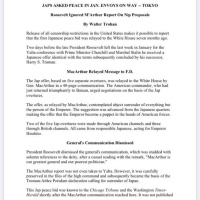追補2018.1.18
『【ワシントン時事】トランプ米大統領は17日、ロイター通信とのインタビューで、ロシアが北朝鮮の制裁逃れを手助けしている可能性を指摘し、「北朝鮮に関してロシアは全く助けてくれない。中国の努力をロシアが台無しにしている」と不満を表明した。 ロシアは洋上で北朝鮮船に石油製品を積み替えている疑いが報じられている。トランプ氏はプーチン大統領について「彼はたくさんのことができる」と強調する一方、「残念ながら、われわれはまだ十分な関係を築けていない」と語った。 インタビューでは、北朝鮮の金正恩朝鮮労働党委員長と「対話してもいい」と改めて述べた。同時に、「対話が意味ある結果につながるかは分からない。彼らは25年間そうやって米国の足元を見てきた」と懐疑的な見方も示した。 北朝鮮が米本土を核で攻撃できる能力を手に入れたかについては、「まだそこまで到達していないが、近づいている」と指摘。核問題に関して「平和的解決は可能だが、それができない可能性が大いにある」と語った。 北朝鮮に先制攻撃を行う可能性も、「難しいポーカーをやっている。手の内は見せないものだ」と否定しなかった。』
揺れるトランプの内心。何もしないという選択で選挙を乗り切るのが順当だが、先制攻撃での政権求心力再建にも魅力がある。
確実に言えるのは時間がないということ。いずれ北朝鮮は能力を身につける。中国もロシアも頼りにならないということ。結論は1つしかない。
今年の国際社会の主役はプーチン。大統領選挙の直前2月末が一つの山場となる。地政学的にはイランをイスラムの脅威とみなしているのは隣国中国とロシアである状況に今後も変わりない。既に年末から国際金融独裁の計略による国家腐蝕攻撃がイラン国内に勃発したからには数年間継続的に外部干渉が継続し長期的にイランの経済と国家機能が麻痺する。イランに国家の体を成すのはイランの精鋭軍事組織「革命防衛隊」の強権だけになるだろう。
他方米国がアフガニスタンを経済支援で切り捨てた後の軍事的空白はロシアが埋める。米国のいないパキスタンの空白はインドを挟みうちにするために中国が軍事支援で埋めるかも知れない。直接にぶつかりたくはない中国とロシアの分担がそこまで決まっていれば、プーチンは最も有効な先制攻撃をイランの湾岸拠点バンダレ・アッバースの封鎖によってイラン経済を抑える。21世紀の真珠湾攻撃と渾名される奇襲作戦である。
その後ロシアはじっくり時間をかけて兵站を伸ばしてアフガニスタンを手中にする。ロシアの経済的基盤はエネルギー輸出にあり、原油価格を決定する物流を抑えることが交渉力になるからだ。
複雑なのはペルシャ湾を航行するイランのミサイル艇は中国から輸入したトンダル級ミサイル艇と言う中イラン軍事関係だ。イラン軍の戦略艦隊と中国軍の艦隊は共同軍事演習を行なっている友好国だ。仮に今、中国の分担に中露合意が無ければ、中共支那軍は悲願の湾岸拠点をイラクに造成する事でイランを飛び越え独自のシーレーンをイラクに完成させて世界経済を石油から支配する作戦もありうるが、そこまでは人民解放軍の兵站が伸びてはいない。今のところ真珠の首飾りは点でしかなく、空母部隊の増強無しにペルシャ湾の奥までは覇権拡張できない。つまりロシアの世界覇権のチャンスは人民解放軍がさらに空母3隻を増強してローテーションが組み上がるまでの三年以内までしかない。プーチンは原油価格の決定権を巡る戦いに打って出ることで再選後任期半ばで中国との避けがたい交戦状態になる。次の任期中にプーチンが何もしなければ国際金融独裁に経済封鎖されて、確実にロシアは衰退することが彼には見えている。だから虚を突いて行動する。
既にサウジアラビアを見捨てている米国はシェール革命以降中東を必要とせず、石油資本もシェールシフトが終了している。米ドル基軸取り引きを捨てたペルシャ湾は米国の利害関係者には無用の海である。ただし米国内の内訌は継続し、軍産複合を支援する国際金融独裁はサウジアラビアに代わるマーケットの代替をどこかに都合するまでは承知しない。ここは単純に金の問題である。誰かにつけを回せばいい。いいカモが我が国日本だ。
China is expected to launch its first yuan-denominated oil futures contract in 2018, and that will mark the beginning of the end for the dollar’s domination of the global oil trade.
The threat of the petroyuan is now considered serious enough to warrant a hatchet job published in The Wall Street Journal. It the article “China’s Bid to Dominate Oil Pricing Will Fail,” Nathaniel Taplin lists a whole bunch of reasons China’s attempts to establish an alternative pricing and trading mechanism for the global oil trade is doomed to failure. However, the arguments presented in the article all boil down to a single thesis: the Chinese leadership is so inept, that it will surely botch every aspect of the petroyuan project launch. That’s a brave, bold and wrong assumption.
この空白の海における将来の戦火を去年から心配しているのだが、特に注目すべきはサウジアラビアがパキスタンを使って入手する核兵器だ。仮にサウジアラビアがイスラエルあるいはフーシに対して核を使えば確実に核報復を受ける。イランに対して使えば北朝鮮が核ミサイルを売ったとみられているので、史上初の相互熱核戦争が起こる可能性がある。
これを使わせないためには、誰かがイスラムの盟主としてサウジアラビアの代わりにマッカを防衛しなければならない。しかし今は盟主がいない。ここに世界の不安定が集中している。米イスラエルにはどうしてもイランにマッカを支配させたくない動機がある。イランシーア派政権の崩壊と新盟主国の誕生はセットでなければならない。
今起こっているイランの戦火の狼煙はマッカまで通じている。シリアの安全地帯の安全はロシアの軍事警察が米国側と調整をとりながら確保するとトランプとプーチンが合意しているので、シリア情勢は米国にとり終わった話し。米国が撤退を決めることでシリアからパキスタンにかけて生じた巨大な空白地帯を誰が埋めるのか?争奪戦に参戦する意思のある国はイスラエル、ロシア、中国。現時点でまだイランが残っているが、排除される。そしてそのどこに対しても利潤追求の手段を確保しているのが国際金融独裁である。中東はこの主役級三国角逐時代とプロモーターの強力な存在により、筋書きがハリウッド化する。問題はどこが支配しても聖地が安定しないという問題を先に残しているという点にある。そこでローマ教皇がどの役を演じるか世界が観客席からのみ見ることになるだろう。一神教統一による神の部隊の創設もあり得る。
それ故に中共支那と国際金融独裁によるプーチンを消す作戦が水面下で進行していると推定している。

東洋経済の予想
『プーチン大統領は来年3月の選挙で勝利するのは確実で、4期目の長期統治に入る。ただ2014年のウクライナ危機以降、ロシアと欧米の関係は冷え込んだままで、米国はロシア国債を対象とする新たな制裁も検討中だ。こうした制裁が発動されれば、外国人投資家のロシア国債売却につながるかもしれない。ロシア国債の今年のリターンは約16%に達し、買い人気を集めていた。バンク・オブ・アメリカ・メリルリンチ(BAML)は、外国人によるロシア国債売りを来年のショックイベントになり得る要素の1つに挙げている。「(実現すれば)プレッシャーは大きくなりかねない」とみるBAMLは、ルーブルの急落と最大370億ドルの資金流出が起きると予想した。』

『ロシアの新聞雑誌・通信社の編集長らとの会談でプーチン氏は、新年初めの現時点での朝鮮半島情勢をどう評価するかとの質問に答え、「言うまでもなく、このゲームに金正恩氏は勝ったと私は思う。金氏は自らの戦略的課題を解決したのだ。つまり、金氏のもとには核爆弾があり、1万3千キロという世界規模の射程を持つミサイルがある。このミサイルは、事実上地球のどの地点にも到達可能で、金氏にとって想定される敵国領土のあらゆる地点に、どのような場合でも届く性能をもつものだ」と述べた。』sputniknews
トランプの北朝鮮を封じ込める貿易封鎖作戦は中国の洋上取り引きを暴いても、ロシア側の道を敢えて開けている。この局面でも調節弁はロシアのプーチンである。平昌オリンピックへの北朝鮮参加を巡って韓国が米国との同盟(合同軍事演習の延期)を売ってトランプと安倍晋三の計算合意が狂い始めている。本当なら激怒級の裏切りだが、トランプ政権は不気味に韓国文在寅を無視して予定通り演習の開始を繰り返し確認している。
昨日オリンピック期間の演習を中止するとトランプ米大統領側が決定した。『ただし、青瓦台(チョンワデ、大統領府)が公開した「我々の助けが必要であれば、いつでも知らせてほしい。米国は100%文在寅大統領を支持する」というトランプ氏の発言は米国側の発表文にはなかった。また「家族派遣」もなかった。』青瓦台は南北統一後自分たちのものになると信じて疑わない核弾頭ICBM完成の時間を稼ぐ為に、好き勝手に「成果」をあげて踊ることになるだろう。
文在寅の裏切りは中国の防衛政策介入を一直線に認めさせる。つまりトランプの求めている北朝鮮核放棄の圧力は中止となる。なぜトランプ政権に激怒級の反応が起こらないのか?一つにはこれが予想通りの文在寅の裏切りだからである。もう一つは米国内のCIAとの綱引きが水面下に起きているため。
では、韓国を無視した上での米国大統領が単独で決められる北朝鮮対策は?二つ。
米国の先制攻撃による解決。中国と妥協して最大譲歩し北朝鮮に核を保有させる一方で日本の核武装と米軍撤退と言う米国対案を認めさせる。前者は一年前に一度検討されたが、中国が引き受けてトランプ政権発足前に中止したと見られる。後者は金正恩が「10兆ドル(約1170兆円)を受け取っても放棄しない」と言明している上に、どちらも双方の合意の上では実行不可能で安倍晋三の同意も得られない無理筋の解決策。
ここにきて安倍晋三はロシアオプションをキープしようと必死になっているが、前回同様に雑音を入れて二階ら中国派議員が裏切るので、党内買収議員を切らずにロシアオプションは完成しない。左様に中共支那の金の力はもの凄く日本の中枢に及んでいる。本来なら汚職だが職務権限のない党人に汚職は立件できない。党人派の旨味は特捜に追われないところにある。疑わしい議員は公認しなければ良いだけのことなのだがそれができない。改憲を前に政治力が必要な安倍晋三は一強などとマスコミに書かれる事情とは裏腹に弱い立場。
森喜朗、石川県第2区 →石原 伸晃
古賀誠、福岡7区
青木幹雄、島根県
谷垣禎一 、京都5区
山崎拓、福岡2区
二階俊博、和歌山3区
中川秀直、広島4区 →中川俊直
ここにロシアの役割が想定される。推定だがトランプ政権になってから米露合意はロシアによる核武装とミサイルの管理で出来上がっているのだろう。その際はどうしてもレジームチェンジが条件となる。金正男が殺されたのは大きい。代わりに立つ人物が全部殺されているか行方不明になっているのだ。今トランプの手の中あるのは正男の息子金漢率がCIAの確保した弱い駒である。CIAが確保したということは国際金融独裁が確保したと同じことで、間接的に北朝鮮の手にある。残念ながらトランプと国際金融独裁は一体同調ではない。ティラーソンからポンペオに国務長官を変えるのであれば、トランプ政権は金漢率を担ぐかもしれないが、傀儡政権作りには時間がかかりすぎる。だからレジームチェンジの見通しは不透明である。
国際金融独裁は中国の覇権国台頭を承認したが、ロシアの覇権国台頭を承認していない。だから今年なにが起こるのか?ロシア国内に反プーチン政府の大暴動が起こる。核武装放棄とミサイルの米露共同管理どころではなくなる。そういう意味でも今年の主役はプーチンである。ロシア国債暴落もあるが、簡単にロシアから300億ドルが流出するとは、国際金融独裁の実力はおそろしい。手法として国際金融独裁が原油価格の急落を使うかどうかは株式市場次第となる。シェールオイルは55ドルが企業採算の下限なので、市場の原油価格操作はそう簡単ではない。北朝鮮には米中露と国際金融独裁と日本など様々な力が加わっている。この様相は満洲の30年代初頭に似ている。結局は大戦争に変化していった歴史を思い起こせば、最も弱いところで戦火が上がる。予想では韓国が破産(少額長期債務に対応した徳政令と軍人を超える81万人の公務員化による失業の解決と言う文在寅トンデモ公約の実現は必然的にモラルハザードと絶望的な内需の縮小再生産に進む)債務を国が無限に肩代わりできない状態を弥縫するために、敗戦を前提とする対北対日本戦争に挑発転化して債務整理の過程で中共支那に国の資産を盗み売り文らが国外に逃げ込む。つまり借金できるだけ借金して建てた家に火をつけて逃げては、あり得ない高金利を保証して他人の財産権までも担保にまた借金して逃げる。逃げる国柄では国民が我先にと雪崩打って社会崩壊する。ソウルにはリャンバンの昔から盗む側と盗まれる側の生存競争文化しか信じているものがない。そういう国柄は逃走と戦火に弱い。短期的大戦争が南北軸だけでなく東西軸米中代理戦争の様相になるだろう。以上が予想と推論による想像だが、米ニュースサイトの報じた中国共産党の「極秘文書」なるものの内容は、中共支那が「北朝鮮がさらなる核実験の中止を約束すれば中国は経済、軍事支援を拡大し金正恩政権の体制を保証する」との方針を決めたというスクープが出た。米国トランプ大統領と中共支那習近平の対立が隠しようもなく明確になろうとしている。この対立にはレジームチェンジ抜きでは米国の得るものが無い。他方習近平が自国の潜在的敵国となる金正恩の体制を維持支援すると決めたのなら、中共支那は金正恩とともに米国を敵国として覇権を強化する方針を決めたことになる。
トランプもまた様々な運命に踊らされている。手駒の無いただ踊らされている男を頼りにしていては永久に地上の天国世界の猿芝居ゲームは終わらない。このゲームを終わらせるのは米国による対北朝鮮金正恩政権に対する宣戦布告しかない。宣戦布告後、不気味に静観の構えを続ければ韓国経済が潰れる。その先は予想と推論による想像の通りとなるだろう。
1961年1月17日、退任演説でアイゼンハワーは、早くも軍産複合体の脅威を訴えていた。


平和を願うのなら、北朝鮮の予測不可能性が日米露支にとって最小化する道を探るしかない。先延ばしにしても最小化しない今年は宣戦布告することが逆にリスクを最小化する。EDWARD LUTTWAKも同じ意見のようだ。
追補2018/1/10
Newsweek日本語
『(略)今のところ、北朝鮮に対する先制攻撃という選択肢を米軍幹部が排除しているのは明らかに見える。だが、北朝鮮が核兵器を搭載可能な長距離弾道ミサイルを実戦配備するまでに残された月日でアメリカが北朝鮮を空爆すれば、果てしない危険から世界を救える。
インド、イスラエル、パキスタンの3カ国が核兵器を保有しているのは事実だが、今のところ破滅的結果を招いていない。3カ国は北朝鮮にないやり方で、自国の信頼性を証明してきた。北朝鮮のように、大使館でヘロインや覚醒剤などのいわゆる「ハードドラッグ」を売ったり、偽造紙幣で取引に手を染めたりしない。3カ国とも深刻な危機に見舞われ、戦争すら経験したが、核兵器に言及すらしなかった。ましてや金正恩のように、核攻撃をちらつかせて敵を脅すなどあり得ない。北朝鮮は異常だ。手遅れになる前に、アメリカの外交政策はその現実を自覚するべきだ。(略)』
Foreinpolicy
ARGUMENT
It’s Time to Bomb North Korea
Destroying Pyongyang’s nuclear arsenal is still in America’s national interest.
BY EDWARD LUTTWAK | JANUARY 8, 2018, 12:48 PM
Nothing can be known about this week’s talks between North and South Korea other than their likely outcome. As in every previous encounter, South Korea will almost certainly reward North Korea’s outrageous misconduct by handing over substantial sums of money, thus negating long-overdue sanctions recently imposed by the United Nations Security Council. Meanwhile, the North will continue to make progress toward its goal of deploying several nuclear-armed, mobile intercontinental ballistic missiles, having already tested nuclear-explosive devices in October 2006, May 2009, February 2013, January 2016, September 2016, and September 2017
Each test would have been an excellent occasion for the United States to finally decide to do to North Korea what Israel did to Iraq in 1981, and to Syria in 2007 — namely, use well-aimed conventional weapons to deny nuclear weapons to regimes that shouldn’t have firearms, let alone weapons of mass destruction. Fortunately, there is still time for Washington to launch such an attack to destroy North Korea’s nuclear arsenal. It should be earnestly considered rather than rejected out of hand.
Of course, there are reasons not to act against North Korea. But the most commonly cited ones are far weaker than generally acknowledged.
One mistaken reason to avoid attacking North Korea is the fear of direct retaliation.One mistaken reason to avoid attacking North Korea is the fear of direct retaliation. The U.S. intelligence community has reportedly claimed that North Korea already has ballistic missiles with nuclear warheads that can reach as far as the United States. But this is almost certainly an exaggeration, or rather an anticipation of a future that could still be averted by prompt action. The first North Korean nuclear device that could potentially be miniaturized into a warhead for a long-range ballistic missile was tested on September 3, 2017, while its first full-scale ICBM was only tested on November 28, 2017. If the North Koreans have managed to complete the full-scale engineering development and initial production of operational ballistic missiles with nuclear warheads in the short time since then — and on their tiny total budget — then their mastery of science and engineering would be entirely unprecedented and utterly phenomenal. It is altogether more likely that they have yet to match warheads and missiles into an operational weapon.
It’s true that North Korea could retaliate for any attack by using its conventional rocket artillery against the South Korean capital of Seoul and its surroundings, where almost 20 million inhabitants live within 35 miles of the armistice line. U.S. military officers have cited the fear of a “sea of fire” to justify inaction. But this vulnerability should not paralyze U.S. policy for one simple reason: It is very largely self-inflicted.
When then-U.S. President Jimmy Carter decided to withdraw all U.S. Army troops from South Korea 40 years ago (ultimately a division was left behind), the defense advisors brought in to help — including myself — urged the Korean government to move its ministries and bureaucrats well away from the country’s northern border and to give strong relocation incentives to private companies. South Korea was also told to mandate proper shelters, as in Zurich for example, where every new building must have its own (under bombardment, casualties increase dramatically if people leave their homes to seek shelter). In recent years, moreover, South Korea has had the option of importing, at moderate cost, Iron Dome batteries, which are produced by both Israel and the United States, that would be capable of intercepting 95 percent of North Korean rockets headed to inhabited structures.
But over these past four decades, South Korean governments have done practically nothing along these lines. The 3,257 officially listed “shelters” in the Seoul area are nothing more than underground shopping malls, subway stations, and hotel parking lots without any stocks of food or water, medical kits or gas masks. As for importing Iron Dome batteries, the South Koreans have preferred to spend their money on developing a fighter-bomber aimed at Japan.
Even now, casualties could still be drastically reduced by a crash resilience program. This should involve clearing out and hardening with jacks, props, and steel beams the basements of buildings of all sizes; promptly stocking necessities in the 3,257 official shelters and sign-posting them more visibly; and, of course, evacuating as many as possible beforehand (most of the 20 million or so at risk would be quite safe even just 20 miles further to the south). The United States, for its part, should consider adding vigorous counterbattery attacks to any airstrike on North Korea.
Nonetheless, given South Korea’s deliberate inaction over many years, any damage ultimately done to Seoul cannot be allowed to paralyze the United States in the face of immense danger to its own national interests, and to those of its other allies elsewhere in the world. North Korea is already unique in selling its ballistic missiles, to Iran most notably; it’s not difficult to imagine it selling nuclear weapons, too.
Another frequently cited reason for the United States to abstain from an attack — that it would be very difficult to pull off — is even less convincing. The claim is that destroying North Korean nuclear facilities would require many thousands of bombing sorties. But all North Korean nuclear facilities — the known, the probable, and the possible — almost certainly add up to less than three dozen installations, most of them quite small. Under no reasonable military plan would destroying those facilities demand thousands of airstrikes.
Unfortunately, this would not be the first time that U.S. military planning proved unreasonable. The United States Air Force habitually rejects one-time strikes, insisting instead on the total “Suppression of Enemy Air Defenses.” This is a peculiar conceit whereby every single air-defense radar, surface-to-air missile, airstrip, and combat aircraft in a given country must be bombed to destruction to safeguard U.S. pilots from any danger, instead of just bombing the targets that actually matter. Given that North Korea’s radars, missiles, and aircraft are badly outdated, with their antique electronics long since countermeasured, the Air Force’s requirements are nothing but an excuse for inaction. Yes, a more limited air attack might miss a wheelbarrow or two, but North Korea has no nuclear-warhead mobile missile launchers to miss — not yet.
Perhaps the only good reason to hesitate before ordering an attack on North Korea is China.Perhaps the only good reason to hesitate before ordering an attack on North Korea is China. But that’s not because Beijing would intervene against the United States. The notion that China is North Korea’s all-around protector is badly out of date. Yes, the Chinese do not want to see North Korea disappear with U.S. troops moving up to the Yalu River and China’s border. But President Xi Jinping’s support for maximum economic sanctions, including a de facto blockade of oil imports — a classic act of war — amounts to a change of sides when it comes to North Korean nuclear weapons. Anybody who believes China would act on North Korea’s behalf in the event of an American attack against its nuclear installations has not been paying attention.
But China’s shift has surfaced a quite different reason for the United States not to bomb: While North Korea’s acquisition of nuclear weapons is of course very dangerous, it does ensure its independence from Chinese influence. In a post-strike scenario, the Pyongyang regime might well crumble, with the country becoming a Chinese ward. That could give Beijing dominant influence over South Korea as well, given the preference of some South Koreans — including President Moon Jae-in, according to reports — for Chinese as opposed to American patronage. A China-dominated Korean Peninsula would make Japan less secure and the United States much less of a Pacific power.
In theory, a post-attack North Korea in chaos could be rescued by the political unification of the peninsula, with the United States assuaging Chinese concerns by promptly moving its troops further south, instead of moving them north. In practice, however, this would be a difficult plan to carry out, not least because South Korea’s government and its population are generally unwilling to share their prosperity with the miserably poor northerners, as the West Germans once did with their East German compatriots.
For now, it seems clear that U.S. military authorities have foreclosed a pre-emptive military option. But the United States could still spare the world the vast dangers of a North Korea with nuclear-armed long-range missiles if it acts in the remaining months before they become operational.
It’s true that India, Israel, and Pakistan all have those weapons, with no catastrophic consequences so far. But each has proven its reliability in ways that North Korea has not. Their embassies, for instance, don’t sell hard drugs or traffic in forged banknotes. More pertinently, those other countries have gone through severe crises, and even fought wars, without ever mentioning nuclear weapons, let alone threatening their use as Kim Jong Un already has. North Korea is different, and U.S. policy should recognize that reality before it is too late.

























